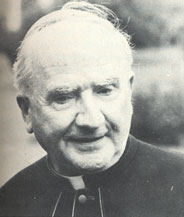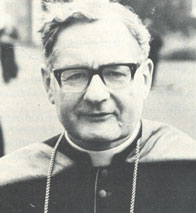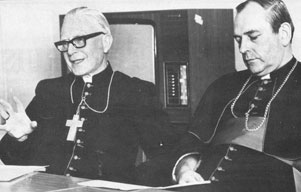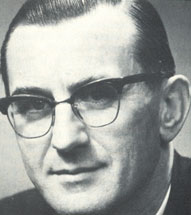Pope John Paul: Not an Inch
The Pope's plea for reconciliation between the religious traditions in Ireland could best have been directed at Catholic bishops, who have stifled ecumenism here for fifteen years.
One of Pope John Paul's major themes in his Drogheda speech three months ago was the promotion of reconciliation between the two traditions - Catholic and Protestant on this island but the Catholic Church's action on ecumenism over the last decade and a half has obstructed this kind of reconciliation and indeed the Pope's own statements later in Limerick and America have arguably made that reconciliation more difficult.
 The Catholic Church in Ireland has steadfastly dug in its heels on the key issues of mixed marriages and interdenominational education and although the stridency of the heirarchy's rhetoric has moderated over the last 10 years there has been no substantive advance on a single ecumenical issue. There are indications, however, of a break-through soon on the mixed marriages issue, although Protestant church leaders still feel that the Catholic Church continues to be obdurate on the matter. The altitude of the Catholic Church in Ireland on ecumenical issues has been in sharp contrast to that of the Church elsewhere, notably in Holland, the United States and Britain.
The Catholic Church in Ireland has steadfastly dug in its heels on the key issues of mixed marriages and interdenominational education and although the stridency of the heirarchy's rhetoric has moderated over the last 10 years there has been no substantive advance on a single ecumenical issue. There are indications, however, of a break-through soon on the mixed marriages issue, although Protestant church leaders still feel that the Catholic Church continues to be obdurate on the matter. The altitude of the Catholic Church in Ireland on ecumenical issues has been in sharp contrast to that of the Church elsewhere, notably in Holland, the United States and Britain.
The ecumenical movement began, for Catholics, with the second Vatican Council. Then, the Catholic Church conceded that Christian unity no longer meant the mass conversion of Protestants, but that all Christians shared - some less perfectly than others - in the truth of Christ. The actual decree on ecumenism was not published until 1964, by which time ecumenical fervour was already running high throughout Catholicism. However the decree is a far more conservative document than the original Council text, having been modified by a higher authority. Although it repeats the traditional doctrine of the Catholic Church as the one true church, it also puts ecumenism firmly at the top of Catholic priorities and places the whole movement under the guidance of the Holy Spirit rather than any Church structure.
Significantly, it was an Irish prelate, the recently enthroned Archbishop Conway, who demurred from the ecumenical fervour of the times in proposing at the Vatican Council in November 1963 that a paragraph be added to the document on ecumenism underlining the necessity of Catholics to have a deeper knowledge of their own faith and insisting that the ecumenical movement, under the authority of the Pope, was subject to the authority and vigilance of the local bishops. At one stroke, the headlong ecumenical drive on inter-denominational education was stayed and the Irish bishops were given a clear mandate to determine in the Irish context how far, if anywhere, the movement should go here.
In Britain, Dr. John Heenan gave the ecumenical movement a more enthusiastic welcome. At his enthronement at Westminster in 1962 he said, "There is already one Westminster Bridge but I propose to build several more. They will be spiritual bridges but not less durable on that account. Of these one will span the Thames from Westminster to Lambeth where a dear friend (Most Reverend Dr. Ramsey) resides. But Westminster will also be linked with other communions."
Predictably, the first Roman Catholic moves towards ecumenism in Ireland came not from the hierarchy but from individual priests. Dr. Kevin McNamara, now Bishop of Kerry, Father Michael Hurley, now director of the Irish School of Ecumenics, and Father Des Wilson were among the first to address Protestant and inter-denominational conferences on the theme of Christian unity. These moves were immediately welcomed by the Protestant churches, particularly the Presbyterians whose General Assembly in 1964 praised the new attitude of the Catholic Church on reconciliation, since there were those in the Northern community "who would turn us into another Cyprus."
In June 1964 forty ministers, priests and theologians of the four main churches met at Saint Columba's Abbey, Glenstal, County Limerick for the first of what was to become an annual ecumenical conference. Two years later, Father Michael Hurley, a main participant of the Glenstal conferences, organised the first of the Greenhills ecumenical conferences. These complemented the Glenstal summer meetings and co-incided with Church Unity Week at the beginning of each year. Members of' the Salvation Army, Quakers, Non-Subscribing Presbyterians, as well as the four main churches, participated. They came unofficially and exchanged information about their different traditions as well as their common bond of baptism.
Some practical progress was achieved in the mid sixties. The Irish Directory on Ecumenism was published. Catholics were allowed to attend funerals, weddings and baptism of Protestants. The first multi-denominational comprehensive school was opened in Cavan. Organisations, religious and secular, invited ecumenists to speak on Christian unity and reconciliation. Church Unity Week, once devoted to prayer for the conversion of non-Catholics, now focused on inter-denominational lectures and eventually prayer sessions and services.
Several members of the Catholic hierarchy, however, were militantly unenthusiastic about the movement. In 1966, Bishop Philbin of Down and Conor; warned that "there is evidence of a movement that would result in the erosion of the very foundations of Christianity ... I feel this propaganda is directed towards much broader change in the life of the Church than envisaged by Vatican Council."
 As late as 1967 Dublin's Archbishop McQuaid reiterated the traditional hierarchy line on attendance by Catholics at Trinity College. He said "the present generation forgets that our forbearers chose exile, even death, rather than conform to non-Catholic education ... we are all obliged to pray for the reunion of Christendom . . . But very few are equipped to handle at close quarters the problems of reunion of Christian dissidents. It is not in the atmosphere of a non-Catholic University that one trains by choice the picked exponents of Catholic faith and morals."
As late as 1967 Dublin's Archbishop McQuaid reiterated the traditional hierarchy line on attendance by Catholics at Trinity College. He said "the present generation forgets that our forbearers chose exile, even death, rather than conform to non-Catholic education ... we are all obliged to pray for the reunion of Christendom . . . But very few are equipped to handle at close quarters the problems of reunion of Christian dissidents. It is not in the atmosphere of a non-Catholic University that one trains by choice the picked exponents of Catholic faith and morals."
The following year during Church Unity Week, Archbishop McQuaid issued a pastoral letter regretting that "the faithful may be confused by these discussions as if there were not only one true church of Christ, the Catholic Church." Unity Week, he said, was just a time for humble prayer that God in His mercy will speed up the time that "those separated from the Holy see in faith and discipline may accept the one true Church of Christ. . . Each and every individual must personally accept the claims of the one true Church, of which the supreme head is the Pope successor of Saint Peter ... In that Church alone are found all the means of holiness given us by our divine Lord Jesus Christ himself."
With the emerging troubles in Northern Ireland in the late 1960s church leaders came together for the first time to issue joint statements condemning violence and to organise interdenominational prayers for peace. Cardinal Conway met with the Irish Council of Churches to discuss the role of Christian churches in modern Irish society. These discussions led to the establishment of a series of working parties on social problems such as alcoholism, violence, rural isolation and housing.
That the churches came together to discuss anything at all attracted more attention in Ireland than it would elsewhere. However, it soon became obvious that there was more to interchurch dialogue than joint reports on non-contentious social problems like alcoholism. The Protestant church leaders were anxious for progress in more difficult areas like mixed marriages, divorce and contraception.
Partly in an attempt to deflect this new direction in ecumenical contacts from the very specific areas which concerned the Protestant churches here, the Catholic hierarchy invited the leaders of the other churches to a conference at Ballymascanlon, near Dundalk, in the summer of 1973 for a discussion on a very much broader and less specific agenda.
Topics for discussion at this first conference were divided into four categories: Church, Scripture and Authority; Baptism, Eucharist, and Marriage; Social and Community Problems; Christianity and Secularism. Subsequent conferences centred on reports from the working committees formed on each topic. In 1977 new, more philosophical, topics were chosen: the Unity of the Church in the New Testament; Historical Breaches in Christendom; Theology Of Christian Unity; Principles and Practice. However, at the 1975 Ballymascanlon conference the Joint Standing Committee on Mixed Marriages was formed. This was the only permanent structure to emerge from Ballymascanlon.
Mixed marriage regulations represent the biggest single obstacle to ecumenical progress as far as the Irish Protestant churches are concerned. The regulations generally require the Catholic partner to such a marriage to promise, sometimes in writing, to do the utmost to see that any children of the marriage are baptised and educated in the Catholic religion. Protestants feel that this promise not only threatens the unity and sanctity of marriage, but is also an obvious drain on their population. Because of this, Protestants have been pressurised to segregate their children from Catholic children, to reduce chances of a mixed marriage.
The Ballymascanlon Standing Committee reported back in 1977. It recorded Protestant grievances on the subject as well as Catholic complaints that non-Catholic ministers were advising and even marrying mixed couples without informing the local Catholic priest. Both groups agreed that in the face of increasing secular marriage among mixed couples, both should provide special joint pastoral care which "would not only deepen the pastoral care of couples contracting a mixed marriage but would further ecumenical relations between the Churches."
This statement goes some way toward the concept of mixed marriage being a possible ecumenical experience. An earlier less conservative report on mixed marriages was issued in 1974 following a seminar at the Irish School of Ecumenics, which none of the Irish hierarchy attended unlike their counterparts in the Protestant Churches. This report concluded that a mixed marriage can result in an inter-church family which would be a positive force in the development toward Christian unity.
Although reports and joint statements from Ballymascanlon have resulted in better interchurch understanding, they have had little practical affect and have ironically coincided with a downswing in ecumenical activity in recent years. One of the reasons for this is that most of the subjects discussed at Ballymascanlon were theological rather than practical issues that had already been discussed more fully elsewhere, at the Glenstal and Greenhills meetings as well as the many well publicised international conferences. Only a few of the Irish Catholic bishops were actively involved in these earlier conferences - Bishops Birch, McNamara, and Cathal Daly.
Within Irish Catholicism, much of the early ecumenical initiative came from members of religious orders rather than the hierarchy or the laity. Consequently, very little that was accomplished has filtered either upward to the Church leaders or downward to parish level. If a local parish has ecumenical services with its Protestant neighbours it is only because the local clergy, Catholic and Protestant happen to have a particular interest in ecumenism. This combination is rare.
 Protestant clergymen are anxious that ecumenical activity should progress at least to include "a regular exchange of pulpits" - to use ecumenical jargon - between Catholics Protestants at Sunday services, activity which the Protestant churches share among themselves. This is a modest aspiration compared with ecumenical services in other countries, many of which have included shared Eucharist, a practice not officially approved by the Catholic Church but not ruled out altogether by Vatican II.
Protestant clergymen are anxious that ecumenical activity should progress at least to include "a regular exchange of pulpits" - to use ecumenical jargon - between Catholics Protestants at Sunday services, activity which the Protestant churches share among themselves. This is a modest aspiration compared with ecumenical services in other countries, many of which have included shared Eucharist, a practice not officially approved by the Catholic Church but not ruled out altogether by Vatican II.
The recent lull in ecumenical activity is not just restricted to Ireland, it is nearly world wide. Internationally, progress on theological matters has gone as far as it can without major changes within the churches. The Anglican/Roman Catholic Commission, set up in 1966 to study church ministry, mixed marriage, eucharist and church authority, has completed its brief.
The Commission published several agreed statements. On recognition of each other's ministries they reached 'full' agreement, although this may now be jeopardised by the Anglican decision in favour of the ordination of women. On the eucharist the level of agreement was 'substantial' rather than full. On authority, Anglicans agreed they could accept the historical primacy of Rome, but there remained grave difficulties over Papal infallibility. On mixed marriages, the Commission agreed that rather than exacting promises it was enough that the priest inform his bishop that he has reminded the Catholic partner of his or her religious duties. In fact, this is already the case in many countries throughout the world although not in Ireland.
There have been international commissions and agreed statements between Catholics and other Protestant Churches, although none as extensive as the Anglican Commission. All these have run their course, and it is now up to the churches to act and either accept or reject the recommendations of their theologians.
The emerging conservatism of the new Pope on a wide variety of issues touching on ecumenism is likely to dampen any remaining impetus within the Catholic Church towards progress on the issue. It is also believed by Protestant leaders here that the death of Cardinal Conway and his replacement by the politically traditionalist Cardinal O'Fiaich will have a similar impact here. However, Father Hurley believes that the new Cardinal has been misconstrued and is very much more open to the ecumenical spirit than previously appreciated - obviously the expected development on mixed marriages will be a test case on this.
 However, Protestant leaders could be forgiven for believing that little has changed here. The attitude of both the
However, Protestant leaders could be forgiven for believing that little has changed here. The attitude of both the
Catholic Church and the southern state on the community schools issue has suggested that the Church is as determined as ever to retain a stranglehold on the educational system and that in its determination to do so it can rely on the complicity of the state. In the light of this and of the procrastination and obduracy over the last 15 years, Pope John Paul's words at Drogheda ring a little hollow:
"There is another word that must be part of the vocabulary of every Christian, especially when the barriers of hate and mistrust have been constructed. This word is reconciliation ... Even when our belief in the fundamental goodness of every human being has been shaken or undermined, even if long held convictions and attitudes have hardened our hearts, there is one source of power that is stronger than every disappointment, bitterness or ingrained mistrust, and that power is Jesus Christ who brought forgiveness and reconciliation to the world.'
